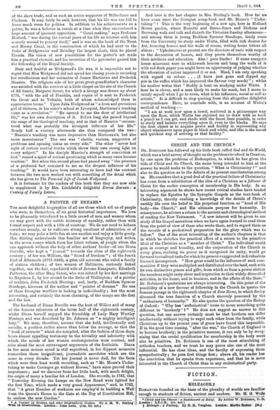CHRIST AND THE CHURCH.*
Dn. ROBINSON has followed up his little book called God and the World, which was a brief survey of thought on the problems involved in Creation, by one upon the problems of Redemption, to which he has given the title of Christ and the Church, the name being intended to hint at the answer he would make to the question, "What is Christianity 7 " and also to the question as to the defects of its present manifestation among us. He considers that a good deal of the practical failure of Christianity has come from a substitution of the idea of a Christian as a follower of Christ for the earlier conception of membership in His body. In an interesting argument he shows how recent critical studies have tended to replace the Epistles by the Synoptic Gospels as the text-book of Christianity, thereby exalting a knowledge of the details of Christ's earthly life over the belief in His perpetual function as "head of His body—tho Church," and His ultimate purpose for humanity. Its consequence, he advises a return to the ancient and chronological method of reading the New Testament. "A new interest will be given to our study of the Gospel narratives when we have again learned to read them from the point of view of these who wrote them, and to regard them as the records of a predestined preparation for the glory which was to follow." One of the most interesting of the author's chapters is that in which he sketches the practical effect of a return to the primitive ideal of the Christian as a "member of Christ." The individual would gain in courage and humility, and the corporation of the Church in every place, realising its power as it recognized its unity, would go forward to confront tasks for which its present exaggerated individualism leaves it incompetent. "How great would be the influence of such cornmimities if they were multiplied and distributed over the land, each with Its own distinctive graces and gifts, from which as from a power station the members might carry cheer and inspiration to their widely diversified activities, in the home, and in business, and in the affairs of the State." Dr. Robinson's quotations are always interesting. On this point of the possibility of a new fervour of fellowship in the Church he quotes the famous passage in the eighteenth chapter of Ecce Homo, in which Seeley discussed the true function of a Church sincerely possessed by the "enthusiasm of humanity." He also quotes the question of the Bishop of Oxford : "Why has ecelesiastical ' come to mean something quite different to ' brotherly ' " He does not suggest an answer to this question, but one answer certainly must be that brothers can differ intellectually without trying to expel each other from the family, while Christians up to the present year of grace have found this impossible. If in the good time coming, "after the war," the Church of England is to become brotherly, in the primitive manner, it can only be by recog- nizing that the credal qualification for membership in the body must also be primitive. Dr. Robinson Is one of the most stimulating of orthodox teachers, and we trust he may prove also one of the most influential. He has clear ideas, and the faculty of expressing them sympathetically ; he puts first things first ; above all, his reader has the conviction that he speaks from experience, and that he is more interested in the Church of Christ than in any ecclesiastical party.






























 Previous page
Previous page